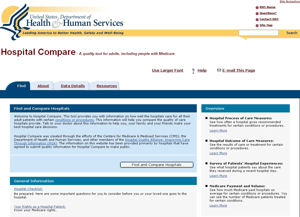Retooled CMS ratings may inspire hospitals' improvement
Pop quiz: How many health care rating schemes are out there?.
Pop quiz: How many health care rating schemes are out there? Fifty? Maybe 100?
Try 221, at minimum. That's more than one new rating scheme for every month of every year since 1992, when Consumer Reports kicked off the party by grading HMOs in its August issue.
Presently, there are at least 86 separate ratings of health plans, 81 of hospitals, 26 of medical groups and 12 of physicians, according to the Agency for Healthcare Research and Quality (AHRQ). Many of these ratings are available online at sites like Healthgrades.com and RateMDs.com.
New and surprising entrants emerge on the scene all the time. Angie's List, best known as a national resource for finding plumbers and roofers, just launched a service that lets it members grade doctors on things like their approachability and the helpfulness of their staff. Health insurer WellPoint recently teamed with Zagat Survey, creator of guidebooks that “use copious quotes” from “foodies” to describe restaurants. Now its policyholders can judge physicians in the same way they might evaluate chopped liver.
“It's kind of a Tower of Babel out there,” said Margaret O’Kane, president of the National Committee for Quality Assurance (NCQA), in describing the different ratings systems at a March health journalism conference in Washington, D.C. NCQA rates health plans, by the way.
Physicians and hospitals are often wary of ratings schemes, arguing that they focus too much on cost, and that factors like staffing ratios and patient demographics aren't taken into account. As well, some raters don't fully explain their methodology, which makes it difficult to improve one's score, they say.

Yet even skeptics generally have good things to say about the new-and-improved Hospital Compare Web site, run by CMS. The site has been around for three years, providing data on 26 quality and outcome measures like mortality rates and heart attack treatment. But it really made a splash in late March when it added patient satisfaction data to the mix.
The new data was derived from a 27-question survey taken by a random sample of patients in more than 2,500 hospitals nationwide. The survey covers factors such as a hospital's cleanliness and quietness, how well doctors and nurses communicate with patients, and whether information is provided to patients on discharge. The survey was standard across all hospitals, and can be found here.
It remains to be seen whether patients will cotton to the site, as research has shown they aren't heavy users of quality data. This may especially be the case when it comes to hospitals, as patients can have limited options in this area: They go to the only hospital in their town, or the one where the ambulance takes them, or the one that their insurance will agree to cover. And when they do have a choice, they tend to rely on the advice of friends and relatives.
The true value of Hospital Compare, then, could lie not so much in helping consumers, but in providing a carrot for hospitals to improve their act.
“Transparency acts synergistically,” said Richard Goldberg, MD, chief medical officer at Georgetown University Hospital, at the March journalism conference. “It has helped hospitals a great deal in having an added reason for following measures of quality and safety.”
Many clearly hope transparency will have the same effect on physicians, given a recent agreement between insurers and major medical, consumer and employer groups to develop a national set of standards to measure doctor performance. Some, like Robert Berenson, FACP, a senior fellow at the Urban Institute who has been rated a “top doctor” by a ratings outfit or two, still have their doubts, however.
“Hospitals are organizations; it's much harder to measure all the things an individual doctor does,” said Dr. Berenson at the conference. “It's like looking for your keys under the light of a street lamp, when really they are off in the bushes somewhere.”




